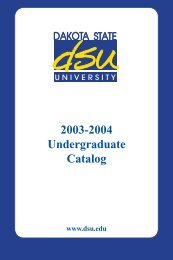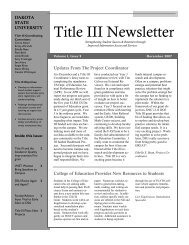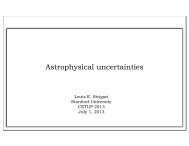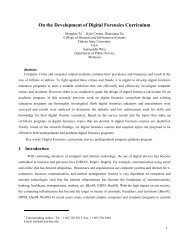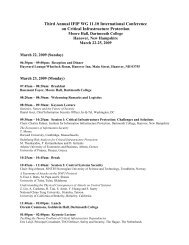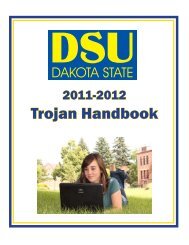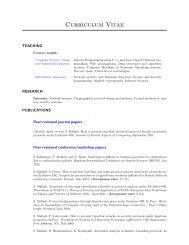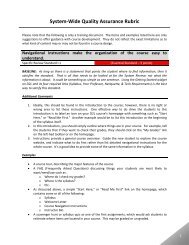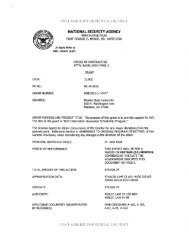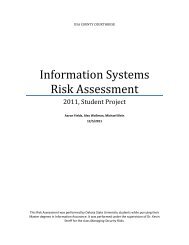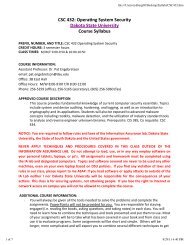Academic Calendar – Fall 2012 - Dakota State University
Academic Calendar – Fall 2012 - Dakota State University
Academic Calendar – Fall 2012 - Dakota State University
You also want an ePaper? Increase the reach of your titles
YUMPU automatically turns print PDFs into web optimized ePapers that Google loves.
Student Conduct Policies & Procedures<br />
47<br />
person who unnecessarily discloses the contents of the record to parties not involved in the appeal shall be<br />
subject to conduct sanction.<br />
ii. In the event of an appeal, the respondent shall be given access to the record for purposes of preparing the<br />
appeal. Access shall be provided at such places and times as the senior student affairs officer may direct.<br />
iii. Except as required by the Americans with Disabilities Act, the institution shall not be required to change the<br />
form in which the record is maintained.<br />
p. No student may be found to have violated the Student Code solely because the student failed to appear before a<br />
student conduct body, unless the student has allegedly failed to obey the direction of a duly empowered student<br />
conduct body, student conduct officer or other institutional officer to appear. In all cases, the evidence in support of<br />
the allegations shall be presented and considered.<br />
B. Sanctions<br />
In each case in which a student conduct body determines that a student has violated the institutional Student Code, the<br />
sanction(s) shall be determined and imposed by the student conduct officer. Where a violation of Board Policy is established,<br />
and where a sanction is mandated under Board Policy, that sanction shall be imposed. In cases in which persons other than or<br />
in addition to the student conduct officer have been authorized to serve as the student conduct body, the recommendation of<br />
all members of the student conduct body shall be considered by the student conduct officer. The judicial student conduct<br />
officer is not limited to sanctions recommended by members of the student conduct body. Following the hearing, the student<br />
conduct body and the student conduct officer shall provide the accused in writing of the findings of fact, conclusions and<br />
recommendations, if any, reached by the student conduct body or student conduct officer and of the sanction(s) imposed, if<br />
any.<br />
1. Complainants shall be informed of any sanctions imposed in the following circumstances:<br />
a. When the sanction involves remedial action that directly relates to the complainant (for example, an order requiring<br />
the student harasser not to have contact with the complainant);<br />
b. Where the allegations against the accused would constitute a crime of violence as defined in section 1(T), above, and<br />
committed a violation of the institution’s rules or policies with respect to that crime.<br />
2. Institutions may disclose the final results of a conduct proceeding when, at their discretion, they conclude that disclosure<br />
will serve a legitimate educational interest and determine through a conduct proceeding conducted under its student<br />
conduct code that the alleged student perpetrator committed a crime of violence or a nonforcible sexual offense that is a<br />
violation of the university’s rules or policies with respect to such crime or offense. For purposes of this subsection, “final<br />
results” means the name of the student perpetrator, the violation committed, and any sanction imposed by the university<br />
on that student. Names of other students involved in the violation, such as a victim or witness, will be released only with<br />
the written consent of that other student or students.<br />
3. Institutions may inform the parents or legal guardians of students under twenty-one years of age that the students have<br />
violated institutional policies concerning the use or possession of alcohol or controlled substances as follows:<br />
a. When the infraction occurs under circumstances that suggest that the student suffers from a serious substance abuse<br />
problem or shows little regard for his or her own health or safety or that of others; or<br />
b. When the student is found to have committed a second violation.<br />
3. The following sanctions may be imposed upon any student found to have violated the institutional Student Code:<br />
a. Warning <strong>–</strong> A conduct notice in writing to the student that the student is violating or has violated institutional<br />
regulations.<br />
b. Censure <strong>–</strong> A written censure for violation of specified regulations.<br />
c. Probation <strong>–</strong> Probation is for a designated period of time and includes the probability of more severe conduct<br />
sanctions if the student is found to be violating any institutional regulation(s) during the probationary period.<br />
d. Loss of Privileges <strong>–</strong> Denial of specified privileges for a designated period of time.<br />
e. Fines <strong>–</strong> Previously established and published fines may be imposed.<br />
f. Restitution <strong>–</strong> Compensation for loss, damage, or injury. This may take the form of appropriate service or monetary<br />
or material replacement.<br />
g. Discretionary Sanction <strong>–</strong> work assignments, service to the institution or other related discretionary assignments.<br />
h. Residence Suspension <strong>–</strong> Separation of the student from residence facilities for a definite period of time, after which<br />
the student is eligible to return. Conditions for readmission may be specified.<br />
i. Residence Expulsion <strong>–</strong> Permanent separation of the student from residence facilities.<br />
j. Suspension <strong>–</strong> Separation of the student from the institution for a definite period of time, after which the student is<br />
eligible to return. Conditions for readmission may be specified. A student who has been suspended from one Board<br />
institution may not be enrolled at another.<br />
k. Expulsion <strong>–</strong> Mandatory separation of the student from the institution for a period of no less than six years. A student<br />
who has been expelled from one Board institution may not be enrolled at another until the period of expulsion has<br />
expired.



